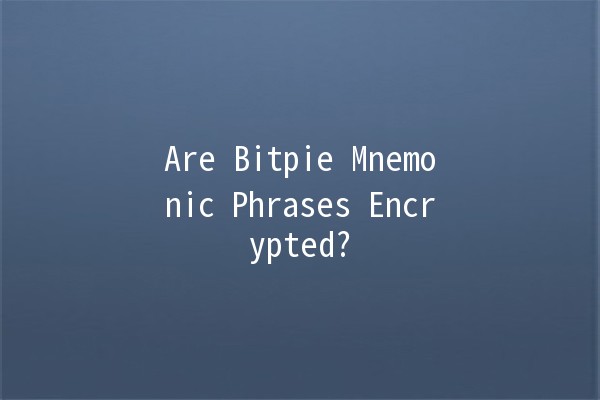
In the realm of cryptocurrency, the security of digital assets is paramount. A key component of this security is the mnemonic phrase, often referred to as a seed phrase. Many users wonder whether the mnemonic phrases produced by wallets like Bitpie are encrypted, as this has significant implications for the safety of their funds. This article will delve into the nuances of Bitpie's mnemonic phrases, exploring whether they are encrypted, how they should be securely stored, and how users can protect themselves in the digital landscape.
Understanding Mnemonic Phrases
What Is a Mnemonic Phrase?
A mnemonic phrase is a series of words that are used to derive a cryptographic key for a cryptocurrency wallet. This phrase typically consists of 12 to 24 words, generated from a predefined list of words (known as the BIP39 standard). The primary purpose of the mnemonic phrase is to provide a humanreadable form to back up and restore wallets.

The Role of Encryption
Encryption involves converting data into a coded form to prevent unauthorized access. In the case of mnemonic phrases, if they are encrypted, the actual content of the phrase is obscured, adding a layer of security. However, if they are not encrypted, anyone with access to the mnemonic can potentially access the associated wallet and its funds.
Are Bitpie Mnemonic Phrases Encrypted?
Bitpie's Security Features
Bitpie, like many other cryptocurrency wallets, allows users to generate a mnemonic phrase upon wallet creation. However, it is crucial to note that these phrases are not inherently encrypted within the app. Instead, the security of the mnemonic phrases largely depends on how users handle and store them.
User Responsibility
While Bitpie may have its own security measures, the ultimate responsibility of safeguarding the mnemonic phrase lies with the user. Users should ensure that their mnemonic phrases are stored securely, ideally offline, rather than within the application itself. Here are several best practices to enhance the security of mnemonic phrases:
Tips for Enhancing Mnemonic Phrase Security
📜 Description: Keeping your mnemonic phrase offline avoids exposure to online threats, including malware and phishing attempts.
Example: Write down your mnemonic phrase on a piece of paper and store it in a safe place, like a safe deposit box or a home safe. This method ensures that your mnemonic is not susceptible to digital breaches.
🔒 Description: Hardware wallets provide a physical way to store your cryptocurrency, including its mnemonic phrase, offline.
Example: Consider purchasing a reputable hardware wallet like Ledger or Trezor. These devices securely store your private keys and mnemonic phrases in a protected environment, minimizing risk from online attacks.
🔐 Description: 2FA adds an additional layer of security by requiring a second form of identification to access your wallet.
Example: Use apps like Google Authenticator or Authy for 2FA when accessing Bitpie or any other wallet to ensure that even if your password is compromised, an unauthorized user would still need access to your 2FA device.
⚠️ Description: Phishing attacks often target unsuspecting users to steal their credentials or mnemonic phrases.
Example: Always verify URLs before entering sensitive information. Ensure that you are on the official site of Bitpie or any wallet service before signing in. Bookmark the official site to avoid being tricked by imitations.
🛠️ Description: Keeping your wallet software up to date can fix vulnerabilities that hackers might exploit.
Example: Periodically check for updates to your Bitpie app on your device’s app store and apply any updates promptly to benefit from the latest security features.
Common Misconceptions about Mnemonic Phrase Security
Are They Automatically Encrypted?
Many users assume that simply creating a wallet automatically encrypts their mnemonic phrases. However, this is not the case with Bitpie. The phrases are often stored in a readable format unless the user implements additional security measures.
Does Bitpie Store My Mnemonic Phrase?
Bitpie does not store your mnemonic phrases or private keys on its servers. This means that if you lose access to your phrase, you may lose access to your funds. Understanding this is crucial for effective wallet management.
The security of your cryptocurrency largely depends on how well you manage your mnemonic phrase. While Bitpie provides an interface for generating and using these phrases, the actual safeguarding of that information is ultimately the user's responsibility. By adopting the recommended practices and remaining vigilant against online threats, users can protect their digital assets from potential theft and loss.
Frequently Asked Questions
If someone obtains your mnemonic phrase, they can access your wallet and potentially steal your funds. That’s why it’s crucial to keep your phrase secure and confidential.
No, if you lose your mnemonic phrase, recovering your wallet is virtually impossible. Always ensure that you back up your phrase in a secure location.
Immediately move your funds to a new wallet with a different mnemonic phrase. This action helps mitigate the risk of losing your assets.
Saving your mnemonic phrase on your computer is not recommended, especially if it is connected to the internet. Opt for secure offline storage methods instead.
You should back up your mnemonic phrase immediately after generating it and whenever you make significant changes to your wallet.
Typically, you cannot change the mnemonic phrase linked to a wallet. The best practice is to back up the original phrase and create a new wallet if you wish to have a different mnemonic.
By understanding the security aspects surrounding your Bitpie mnemonic phrase, you position yourself to maintain better control over your digital assets. Always prioritize security, stay informed about potential threats, and keep your mnemonics safe and sound!

